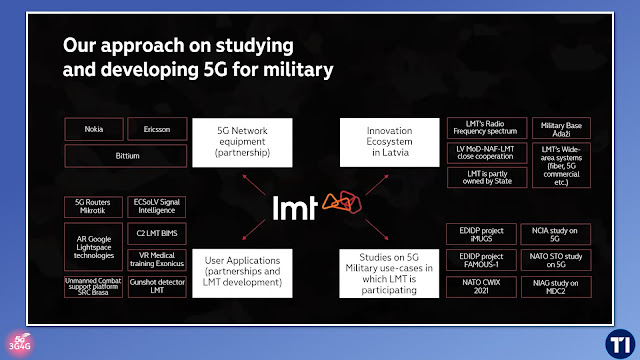Integrated Modular Unmanned Ground Systems (iMUGS) consortium is a 13-party collaboration focused on standardising a European-wide ecosystem for aerial and ground platforms, command, control and communication equipment, sensors, payloads, and algorithms. The parties involved in the iMUGS project are Milrem Robotics, Latvijas Mobilais Telefons (LMT), Talgen Cybersecurity, Safran Electronics & Defense, NEXTER Systems, Krauss-Maffei Wegmann, Diehl Defence, Bittium, Insta DefSec, sol.one, dotOcean, GMV Aerospace and Defence, and Royal Military Academy of Belgium.
Within the iMUGS project, the Latvian MNO LMT is conducting a study on the potential use of 5G in autonomous military solutions. Back in September, the future role of 5G in autonomous military solutions was demonstrated by LMT in collaboration with the iMUGS Consortium.
A press release said:
The demonstration, during which various scenarios were played out in battlefield-like conditions while showcasing specific use cases, took place today, on September 23rd, at the Ādaži military base in Latvia.
This was the second of a total of six demonstrations with the aim of showcasing the results of the iMUGS (Integrated Modular Unmanned Ground System) project – one of Europe’s leading defence industry development projects. The demonstration was organised by LMT, one of the members of the iMUGS consortium, with the support of the Latvian National Armed Forces and the project coordinator Milrem Robotics.
During the demonstration, the troops played out close-to-reality military scenarios in operational environments and relevant climatic conditions. Milrem Robotics’ unmanned ground vehicle THeMIS, was used, along with a number of other cutting-edge military technologies, such as:
- LMT’s battle Information Management System for displaying the data of the payloads and as a command system for scenario execution
- LMT’s Intelligence Surveillance Reconnaissance (IRS) system for performing aggressive fire detection and source recognition
- The ISR system ‘Skudra’ for performing the signal intelligence mission
- A highly protected wheeled vehicle DINGO 2 as a command post from which the mission was led
Alternative communication networks were used by the troop and an unmanned ground vehicle, in scenarios that included switching from a tactical network, provided by Bittium in collaboration with LMT, to 4G and 5G networks.
Some videos shared by LMT are embedded below:
At the 5G Techritory 2021, Armands Meirāns, Innovation Leader for Defence & Public Safety at LMT gave a presentation on 5G for Defense, as showcased by iMUGS Consortium. His talk is embedded below:
Related Posts:
- Operator Watch Blog: LMT Explains 5G Routes Project
- Operator Watch Blog: 5G and Innovation by Latvian MNO LMT
- Connectivity Technology Blog: Virve 2.0 is becoming a broad-band service
- The 3G4G Blog: Virve 2.0 - Finland's 4G/5G Public Safety Network
- The 3G4G Blog: Maritime Communication (MARCOM) Services over 3GPP system
- The 3G4G Blog: Update from 3GPP on LTE & 5G Mission Critical Communications
- The 3G4G Blog: Update on UK's Emergency Services Network (ESN) from #BAPCO2019
- The 3G4G Blog: Tutorial on Network In a Box (NIB)
- Connectivity Technology Blog: Kima - Faroese Telecom's Mission Critical Communications Solution
- Telecoms Infrastructure Blog: Samsung's 3GPP-Compliant PS-LTE Network
- Telecoms Infrastructure Blog: Meshing for BYOC (Bring Your Own Coverage)


No comments:
Post a Comment